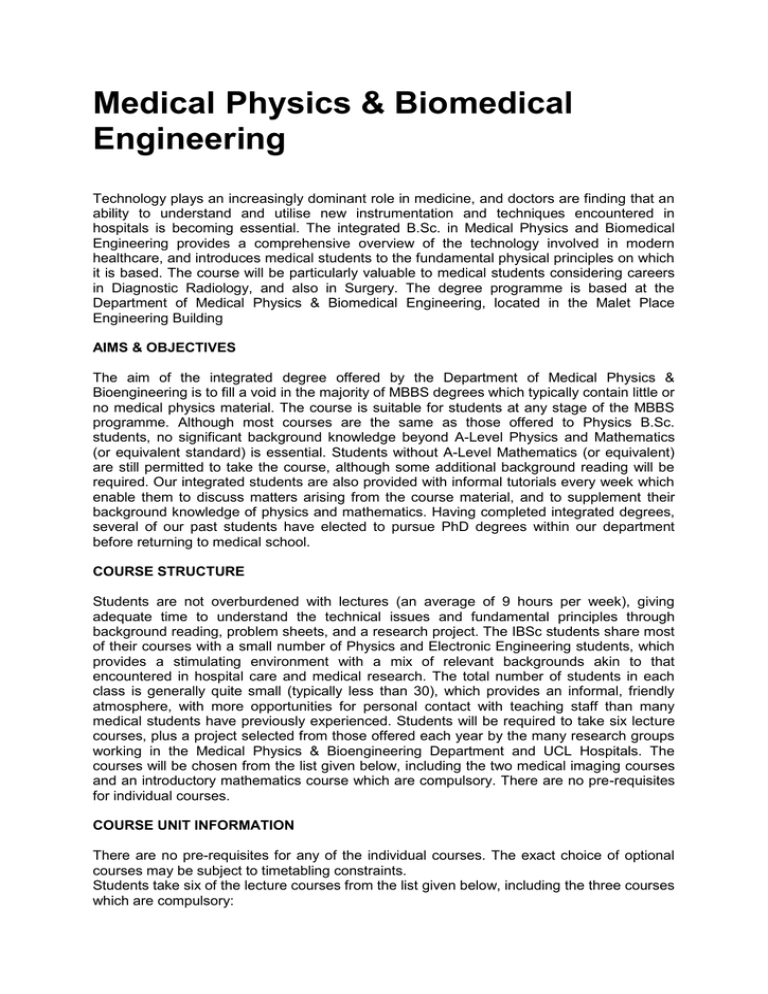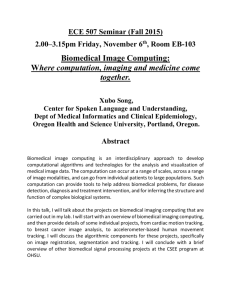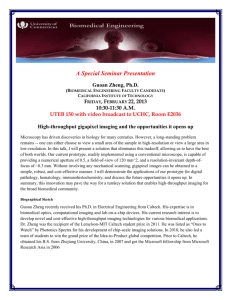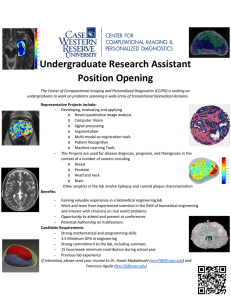Medical Physics & Biomedical Engineering
advertisement

Medical Physics & Biomedical Engineering Technology plays an increasingly dominant role in medicine, and doctors are finding that an ability to understand and utilise new instrumentation and techniques encountered in hospitals is becoming essential. The integrated B.Sc. in Medical Physics and Biomedical Engineering provides a comprehensive overview of the technology involved in modern healthcare, and introduces medical students to the fundamental physical principles on which it is based. The course will be particularly valuable to medical students considering careers in Diagnostic Radiology, and also in Surgery. The degree programme is based at the Department of Medical Physics & Biomedical Engineering, located in the Malet Place Engineering Building AIMS & OBJECTIVES The aim of the integrated degree offered by the Department of Medical Physics & Bioengineering is to fill a void in the majority of MBBS degrees which typically contain little or no medical physics material. The course is suitable for students at any stage of the MBBS programme. Although most courses are the same as those offered to Physics B.Sc. students, no significant background knowledge beyond A-Level Physics and Mathematics (or equivalent standard) is essential. Students without A-Level Mathematics (or equivalent) are still permitted to take the course, although some additional background reading will be required. Our integrated students are also provided with informal tutorials every week which enable them to discuss matters arising from the course material, and to supplement their background knowledge of physics and mathematics. Having completed integrated degrees, several of our past students have elected to pursue PhD degrees within our department before returning to medical school. COURSE STRUCTURE Students are not overburdened with lectures (an average of 9 hours per week), giving adequate time to understand the technical issues and fundamental principles through background reading, problem sheets, and a research project. The IBSc students share most of their courses with a small number of Physics and Electronic Engineering students, which provides a stimulating environment with a mix of relevant backgrounds akin to that encountered in hospital care and medical research. The total number of students in each class is generally quite small (typically less than 30), which provides an informal, friendly atmosphere, with more opportunities for personal contact with teaching staff than many medical students have previously experienced. Students will be required to take six lecture courses, plus a project selected from those offered each year by the many research groups working in the Medical Physics & Bioengineering Department and UCL Hospitals. The courses will be chosen from the list given below, including the two medical imaging courses and an introductory mathematics course which are compulsory. There are no pre-requisites for individual courses. COURSE UNIT INFORMATION There are no pre-requisites for any of the individual courses. The exact choice of optional courses may be subject to timetabling constraints. Students take six of the lecture courses from the list given below, including the three courses which are compulsory: MPHY3000: PHYSICS PROJECT – BSc (1 unit) Terms 1 & 2 (Compulsory course) Project Co-ordinator: Professor Jem Hebden Assessment: Final report (85%) + oral presentation (15%) This represents an opportunity to work within one of the department’s research groups on a self-contained project related to their on-going research activities. The project often involves working closely with a small team of full-time researchers, and is usually a major highlight of the student’s intercalated year. A project is selected by the student at the start of the academic year from a list placed on a website during the summer. Assessment is based on an extensive final report and a short (15 minute) oral presentation at the end of the second term. MPHY3893: MATHEMATICAL METHODS IN MEDICAL PHYSICS (0.5 unit) Term 1 (Compulsory course) Course Co-ordinator: Professor Jem Hebden Assessment: Exam (80%) + coursework (20%) This introductory course is designed specifically for intercalated students in order that they gain a basic familiarity with various mathematical techniques and notation which form part of their other lecture courses. The lectures emphasise the need for an intuitive understanding of specific methods and their application rather than a rigorous training in mathematics. MPHY3890: MEDICAL IMAGING WITH IONISING RADIATION (0.5 unit) Term 2 (Compulsory course) Course Co-ordinator: Professor Robert Speller Assessment: Exam (80%) + coursework (20%) The most frequently undertaken clinical investigation apart from the analysis of a blood sample is the use of ionising radiation to image or investigate the function of an organ. This course covers the theoretical background to the formation and analysis of such images and uses clinical examples to illustrate the application of the imaging systems. It covers both planar and cross sectional imaging using x-ray and gamma ray sources. MPHY3892: TREATMENT USING IONISING RADIATION (0.5 unit) Term 1 (Optional course) Course Co-ordinator: Dr. Adam Gibson Assessment: Exam (80%) + coursework (20%) The aim of this course is to present the basic physics involved in radiotherapy. This includes a knowledge of how quantities of radiation and radiation doses are measured, including the theory of radiation detectors and dosimeters; a knowledge of how cells are affected by exposure to ionising radiation and the mechanisms involved; knowledge of how the treatment plan for a patient is developed and carried out; and a knowledge of the risks involved and the concepts of radiation protection. MPHY3900: ULTRASOUND IN MEDICINE (0.5 unit) Term 2 (Optional Course)* Course Co-ordinator: Dr. Ben Cox Assessment: Exam (80%) + coursework (20%) The purpose of this course is to provide a complete introduction to the physics and clinical application of biomedical ultrasound. Clinically, ultrasound is already the most widely used imaging modality, and its application to therapy has grown rapidly over the last decade. Students who take this course will have a solid grounding in ultrasound to take into research or clinical work. MPHY3910: MRI AND BIOMEDICAL OPTICS (0.5 unit) Term 1 (Optional course)* Course Co-ordinator: Dr. Ben Cox Assessment: Exam (80%) + coursework (20%) This module is an introduction to both magnetic resonance imaging (MRI) and Biomedical Optics as used in clinical applications, with an emphasis on the underlying physical principles. It will provide a solid foundation for students who wish to: a) understand the physical principles of MRI and Biomedical Optics, b) understand how medical physics can be used to improve clinical practice, c) pursue research, or develop clinical or industrial applications, in MRI or Biomedical Optics. *Although MPHY3900 (Ultrasound in Medicine) and MPHY3910 (MRI and Biomedical Optics) are optional, students must select at least one of these modules. Both modules can be selected if desired. MPHY3012: PHYSIOLOGICAL MEASUREMENT (0.5 unit) Term 1 (Optional course) Course Co-ordinator: Dr. Martin Fry Assessment: Exam (85%) + coursework (15%) The course provides an in-depth understanding of the theory and practice of transducers and monitoring techniques in physiology and medicine, and covers most of the commonly used methods in medical practice with the exception of those derived from imaging and radionuclide methods. Topics include blood pressure sensing, gait analysis, temperature measurement, respiratory monitoring, optical sensing methods in oximetry and blood flow, and blood analysis. MPHY3B22: APPLICATIONS OF BIOENGINEERING (0.5 unit) Term 1 (Optional course) Course Co-ordinator: Dr. Terence Leung Assessment: Exam (100%) This module illustrates how the foundation knowledge of bioengineering is used in the provision of clinical services. Topics include EEG/ECG/EMG, respiratory measurements, rehabilitation engineering and aspects relating to medical devices. MPHY3B27: COMPUTING IN MEDICINE (0.5 unit) Term 1 (Optional course) Course Co-ordinator: Dr. Adam Gibson Assessment: Exam (67%) + coursework (33%) This course will equip you with the necessary skills to critically evaluate a computer’s major hardware and software components; describe the use of computers in hospitals; understand the principles of computer-assisted diagnosis; understand the basics of computer programming; write computer programs in Matlab and understand the basics of image processing. MPHY3013: MEDICAL ELECTRONICS AND NEURAL ENGINEERING (0.5 unit) Term 2 (Optional course) Course Co-ordinator: Professor Nick Donaldson Assessment: Exam (80%) + coursework (15%) + lab report (5%) For students interested in the fundamental processes involved in the development of new medical instruments, this course provides a valuable introduction to electronics applied to medicine. Topics include: the origin and measurement of electrophysiological signals; electrodes; muscle stimulation; and electric shock hazards and safety devices. Material taught in the classroom will be supplemented with laboratory practicals and visits to local hospitals. MPHY2002: INTRODUCTION TO BIOPHYSICS (0.5 unit) Term 2 (Optional course) Course Co-ordinator: Dr. Adrien Desjardins Assessment: Exam (80%) + coursework (20%) The course will provide an introductory overview of the biophysics pertinent to the human body. Topics covered will include: foundational physics; biological polymers; biological energy; transport processes; membranes; nerve signals; and imaging/analytical techniques. Students will learn about these topics as they relate to the practice of Medical Physics. Project information and examples of previous projects can be found at: http://www.ucl.ac.uk/medphys/undergrad/mphy3000 Numerous projects have led to publications in peer reviewed journals including: R. J. Cooper, D. Bhatt, N. L. Everdell, and J. C. Hebden, A tissue-like optically turbid and electrically conducting phantom for simultaneous EEG and near-infrared imaging, Physics in Medicine and Biology 54, N403-N408, 2009. T. Correia, A. Banga, N. L. Everdell, A. P. Gibson, and J. C. Hebden, A quantitative assessment of the depth sensitivity of an optical imaging systems using a solid dynamic tissue-equivalent phantom, Physics in Medicine and Biology 54, 6277-6286, 2009. R. J. Cooper, R. Eames, J. Brunker, L. C. Enfield, A. P. Gibson, and J. C. Hebden, A tissue equivalent phantom for simultaneous near-infrared optical tomography and EEG, Biomedical Optics Express 1, 425-430, 2010. I. Tachtsidis, Gao L., T. Leung, M. Kohl-Bareis, C. Cooper, C. E. Elwell A hybrid multidistance phase and broadband spatially resolved spectrometer and algorithm for resolving absolute concentrations of chromophores in the near-infrared light spectrum. Advances in Experimental Medicine and Biology 662: 169-75 (2011) COURSE TUTOR CONTACT DETAILS & WEBSITE DETAILS Prospective students requiring more information are invited to contact the Admissions Tutor, and/or visit the department’s extensive website at the following address: Department home webpage: http://www.ucl.ac.uk/medphys IBSc degree webpage: http://www.ucl.ac.uk/medphys/undergrad/intercal The Admissions Tutor will also be happy to arrange for an informal visit to discuss the course, and for prospective students to talk to IBSc students currently studying on this course. Contact: Professor Clare Elwell, Email: c.elwell@ucl.ac.uk, Phone: 020 7679-0270 or 0200


